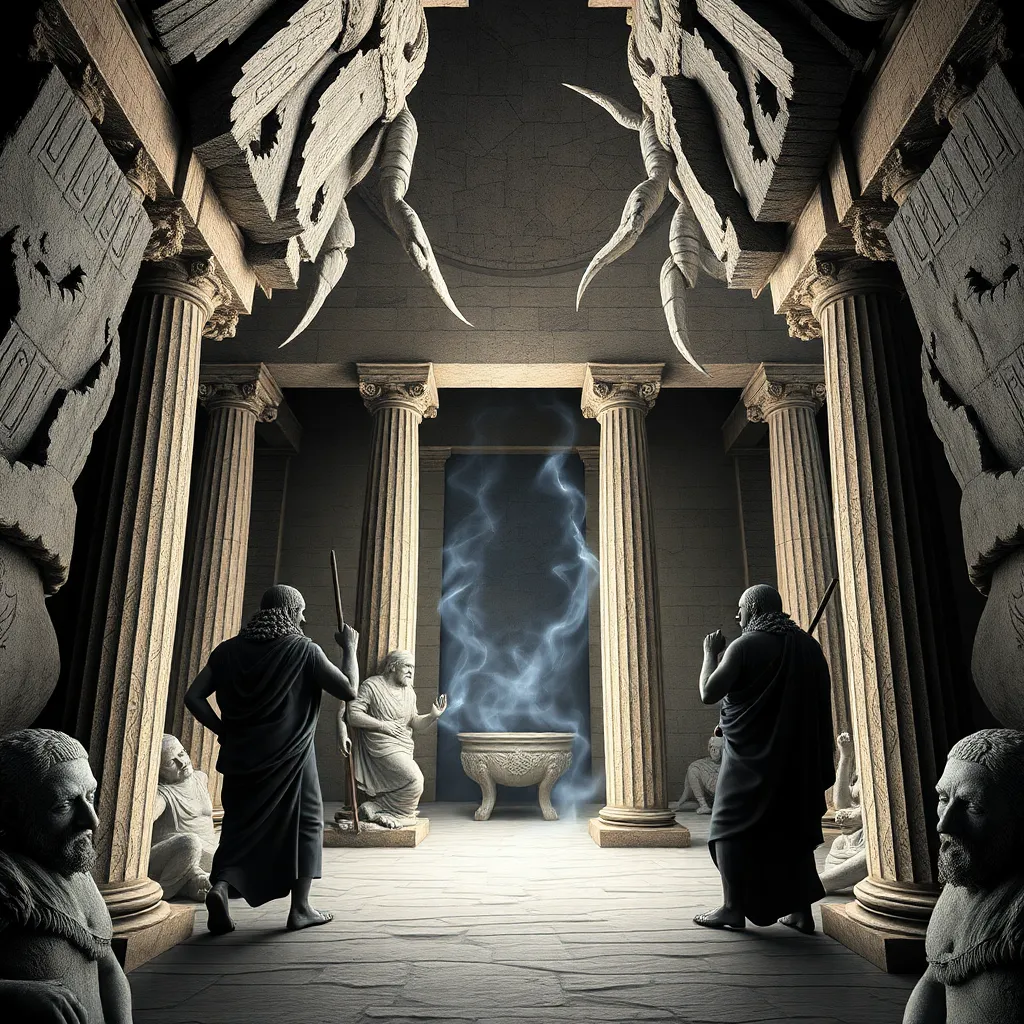The Underworld’s Role in the Formation of Greek Cultural Identity
I. Introduction
The Underworld, known as Hades in Greek mythology, serves as the realm of the dead and plays a crucial role in the cultural and spiritual identity of ancient Greece. It is not merely a place of despair and darkness; rather, it embodies complex beliefs about life, death, and existence. The significance of the Underworld in Greek culture extends beyond mythological narratives, influencing moral values, artistic expression, and societal practices.
This article aims to explore the multifaceted role of the Underworld in shaping Greek cultural identity, examining its mythological foundations, representations in literature and art, moral implications, ritual practices, philosophical inquiries, and contemporary interpretations.
II. Mythological Foundations of the Underworld
The Underworld is portrayed as a vast and intricate realm, governed by Hades, the god of the dead. It is often depicted as being divided into various sections, each catering to different fates of the deceased. The key components include:
- Elysium: A blissful paradise for the virtuous and heroic.
- Tartarus: A deep abyss for the wicked and those who defied the gods.
- The Asphodel Meadows: A neutral area for souls who lived average lives.
Central to the mythology of the Underworld is the myth of Hades and Persephone. Persephone, the daughter of Demeter, is abducted by Hades to become his queen. This myth symbolizes the changing seasons, reflecting the cycle of life and death. It illustrates the Greeks’ understanding of the afterlife, where death is not an end but a transformation.
The symbolism of death and the afterlife in Greek thought is profound, representing not only the fear of the unknown but also the hope for immortality and remembrance. The Underworld serves as a reminder of the inevitable fate that awaits all, shaping attitudes towards life and legacy.
III. The Underworld in Literature and Art
The Underworld has been a subject of fascination in Greek literature, particularly in epic poetry. Notable works include:
- Homer’s “Odyssey”: Odysseus’ journey to the Underworld reveals insights into Greek views on death and the afterlife.
- Hesiod’s “Theogony”: Examines the origins of the gods and the Underworld’s role in the cosmic order.
Artistic depictions of the Underworld also abound in ancient pottery and sculpture. These artworks often portray scenes of judgment, the ferryman Charon, and the torments of the damned, showcasing the Greeks’ rich imagination regarding the afterlife. Such representations have significantly influenced Greek cultural identity by embedding the concepts of mortality and moral accountability into the collective consciousness.
IV. The Underworld and Moral Values
The Underworld is deeply intertwined with Greek moral philosophy, particularly in concepts of justice and retribution. The idea of divine judgment plays a critical role in shaping ethical behavior:
- Minos, Rhadamanthus, and Aeacus: The three judges of the dead determine the fate of souls based on their earthly actions.
- Retributive Justice: The Underworld serves as a deterrent, encouraging individuals to live virtuously or face punishment in the afterlife.
This connection between the Underworld and societal norms fosters a culture that values honor, integrity, and communal responsibility. The fear of eternal punishment or the hope for reward in the afterlife reinforces ethical behavior and shapes the moral fabric of Greek society.
V. Rituals and Practices Related to the Underworld
Funerary customs in ancient Greece highlight the importance of the Underworld in cultural practices. These rituals were essential for ensuring safe passage for the deceased:
- Burial Rites: Included offerings to the dead, such as coins for Charon, to facilitate their journey to the Underworld.
- Grief and Mourning: Family members engaged in rituals to honor the deceased, reflecting their ongoing connection with the dead.
Festivals such as the Anthesteria celebrated the dead, inviting spirits to partake in the festivities. This festival not only honored the ancestors but also reinforced community bonds, as people collectively remembered and celebrated their heritage. The impact of these practices on community identity remains profound, as they shaped a shared understanding of life, death, and the continuity of existence.
VI. The Underworld’s Influence on Philosophy
Philosophers in ancient Greece offered various interpretations of the Underworld, using it as a metaphor for existential inquiry:
- Plato: In “The Republic,” he discusses the soul’s immortality and the implications of life after death.
- Socrates: Emphasized the importance of living a virtuous life, as the soul’s fate in the Underworld reflects one’s earthly actions.
The Underworld serves as a philosophical lens for exploring deeper questions of existence, morality, and the nature of the soul. It encourages individuals to reflect on their lives and the impact of their choices, linking the Underworld to the pursuit of knowledge and truth.
VII. The Underworld in Contemporary Interpretations
In modern times, the Underworld continues to captivate audiences through literature, film, and art. Adaptations of classical myths often reinterpret the Underworld, making it relevant to contemporary issues:
- Literature: Novels and poetry explore themes of loss, memory, and the afterlife, drawing inspiration from ancient narratives.
- Film and Television: Movies often depict the Underworld in various genres, reinforcing its cultural significance and adaptability.
The ongoing relevance of the Underworld in Greek cultural identity today is evident in how it shapes discussions on mortality, ethics, and the human experience. It serves as a powerful lens for understanding contemporary societal issues, such as grief, justice, and the search for meaning.
VIII. Conclusion
In conclusion, the Underworld’s multifaceted role in Greek culture is a testament to its significance in shaping cultural identity. From its mythological foundations and artistic representations to its influence on moral values and philosophical inquiry, the Underworld remains an integral aspect of Greek heritage. The lasting impact of Underworld mythology on Greek identity underscores the importance of understanding this enigmatic realm in cultural studies. As we reflect on the rich tapestry of Greek mythology, the Underworld invites us to consider the deeper questions of life, death, and what it means to be human.




